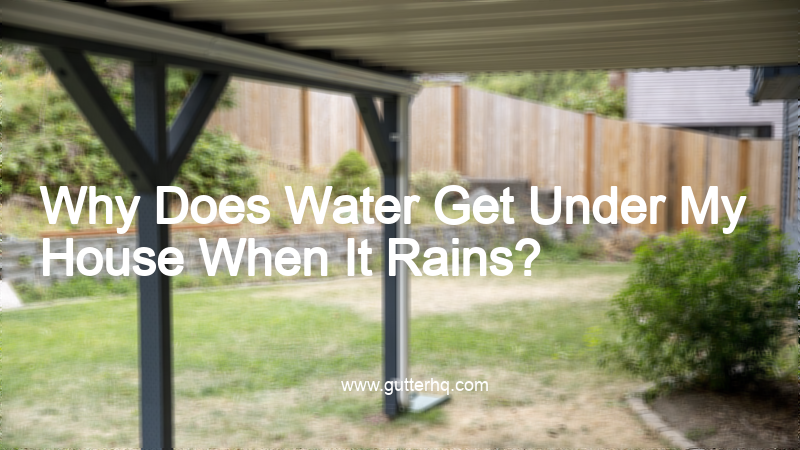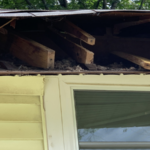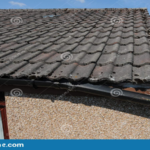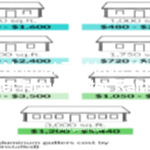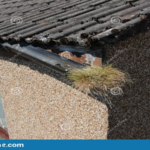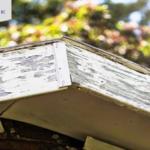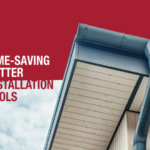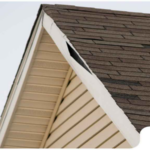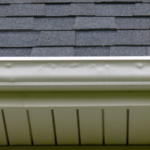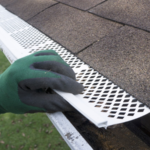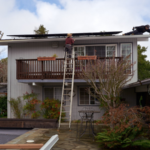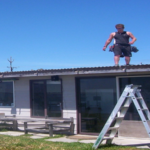The water is getting under your house because it is following the path of least resistance. When it rains, the water runs down your roof and hits the ground. If your gutters are clogged, the water will overflow and run down the side of your house. The water will then seep into the ground and travel through the soil until it reaches the foundation of your house. Once the water reaches the foundation, it will seep through any cracks or gaps and enter your basement or crawl space.
How do I stop rain water from going under my house?
- Make sure your gutters and downspouts are clean and free of debris. This will help ensure that water can flow freely away from your house.
- Check the grading around your house. If the ground around your house slopes towards your house, rainwater will run towards your house and potentially seep under it. You can correct this by adding soil to the low areas to create a slope away from your house.
- Install a French drain. A French drain is a trench that is filled with gravel and has a pipe running through it. It helps to collect and redirect water away from your house.
- Seal any cracks or gaps in your foundation. Water can seep through these openings and into your basement or crawlspace. Use caulk or hydraulic cement to seal any cracks or gaps.
- Add extensions to your downspouts. By extending your downspouts, you can ensure that water is directed further away from your house.
By following these tips, you can help keep rainwater from going under your house.
Is it normal to have water under house after rain?
Yes, it is quite normal for water to pool under a house after a rainstorm. There are a few reasons why this might happen. First, if the ground around the house is not properly graded, then water will naturally flow towards the foundation of the house during a rainstorm. This can cause a pooling of water under the house. Additionally, if the gutters around the house are not properly installed or maintained, then they will not be able to properly channel water away from the foundation of the house. This can also lead to a pooling of water under the house. Finally, if there are any cracks or leaks in the foundation of the house, then water can seep into the house during a rainstorm and cause a pooling of water under the house. If you are concerned about water pooling under your house, then you should consult with a contractor to see if any of these issues are present.
Why is there water in my crawlspace when it rains?
There are several reasons why water might be appearing in your crawlspace when it rains. One possibility is that your gutters are not properly diverting water away from your home, and rainwater is seeping in through the foundation. Another possibility is that there is a crack or hole in your foundation that is allowing water to seep in. If you have a sump pump in your crawlspace, it could also be that the pump is not working properly and is not draining the water out fast enough. Whatever the reason, it is important to find out why water is entering your crawlspace and to take steps to fix the problem, as otherwise it could lead to serious damage to your home.
Is it normal to have water under house?
There are a few potential explanations for why there might be water under your house. It could be that there is a leak in your plumbing or that rainwater is seeping in through cracks in your foundation. If you have a basement, it is also possible that the water is coming from a broken pipe or appliance. If you are concerned about the water under your house, you should contact a professional to inspect your home and determine the source of the water.
How do I dry out my crawl space under my house?
First, you need to identify the source of the moisture in your crawl space. If it is coming from the ground, you will need to install a vapor barrier. If it is coming from the walls or foundation, you will need to seal any cracks or holes. Once the source of the moisture has been identified and corrected, you can begin to dry out the space.
This can be done by opening up the space to the outside air as much as possible. If the weather is dry, you can set up fans to help circulate the air. You may also need to use a dehumidifier to remove any remaining moisture. Once the space is completely dry, you can seal it off to prevent future moisture problems.
How can I absorb water under my house?
- If you have a sump pump, you can use it to pump water out from under your house.
- You can also use a submersible pump to remove water.
- If the water is not too deep, you can also use a wet/dry vacuum to remove the water.
Will a crawl space dry out on it’s own?
A crawl space is an enclosed area beneath a building, typically found in older homes. Crawl spaces are often damp and humid, which can lead to mold and mildew growth. While a crawl space will eventually dry out on its own, it is often a slow process. To speed up the drying out process, you can ventilate the crawl space and use a dehumidifier.
How do I protect my house foundation from rain?
Foundation damage is one of the most common problems homeowners face. Water is the number one enemy of your foundation, so it’s important to take steps to protect it from rain.
- Make sure your gutters and downspouts are clean and in good condition.
- Install a foundation drain around the perimeter of your foundation.
- Make sure the ground around your foundation slopes away from the house.
- Cover exposed foundation with a waterproof sealant.
- Check for leaks inside your home and repair them promptly.
By taking these steps, you can help keep your foundation in good condition and avoid costly repairs down the road.
How do I stop water coming in my crawl space?
- Install gutters and downspouts around the perimeter of your home, and make sure they’re clean and clear of debris.
- Grade the ground around your home so that it slopes away from the foundation.
- Seal any cracks or openings in your foundation with caulking or concrete.
- Install a vapor barrier on the ground in your crawl space to prevent moisture from coming up through the soil.
- Install a dehumidifier in your crawl space to help keep the air dry.
Conclusion
There are a few reasons why water might be getting under your house when it rains. It could be that your gutters are blocked and not redirecting water away from your home, or there could be a crack in your foundation that’s allowing water to seep in. Whatever the reason, it’s important to get to the bottom of it and fix the problem so that your home doesn’t sustaining any water damage.
